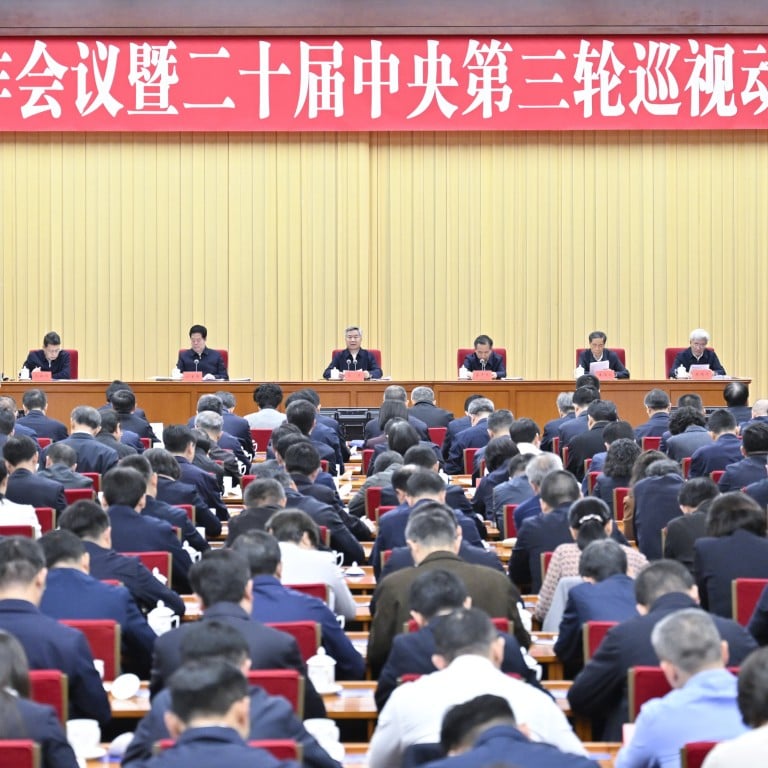
China turns up heat with regulators, banks under the microscope amid focus on financial revamp
- Vital economic and financial regulators, as well state-owned banks, will be targetted as part of a round of discipline inspections
- Inspections will focus on vital finance and economy-related entities, said anti-corruption body chief Li Xi, amid Beijing’s focus on a financial reshuffle
China has initiated a new round of inspections on major economic and financial regulators, as well as the big four state-owned banks, marking the latest step in Beijing’s revamp to keep close tabs on the sprawling industry.
The 34 targets of the discipline inspections – a routine tool to identify corruption and ensure government agencies toe the Communist Party line, include China’s central bank, its banking, securities and foreign exchange regulators, the top economic planner and the finance ministry, the state-backed Xinhua News Agency said on Monday.
China’s five largest state banks – the Industrial and Commercial Bank of China, the Agricultural Bank of China, the Bank of China, China Construction Bank and the Bank of Communications – two state-owned insurers and the Export-Import Bank of China will also open their doors for reviews by the the country’s top anti-corruption body.
China’s banks cut salaries, rescind bonuses amid Beijing’s financial reshuffle
The financial sector, including regulatory bodies and financial service firms, has traditionally been a key target for Beijing’s anti-corruption drive.
On top of that, the top leadership has embarked on a sweeping remoulding of the world’s second-largest financial market and its 461 trillion yuan (US$63.7 trillion) asset pool.
Anti-corruption body chief Li Xi said on Monday that the inspections would focus on vital finance and economy-related entities.
He told inspectors to check the functions, responsibilities and performance of financial units to “enforce discipline, tackle risks, find deviations from the party’s political course and rectify problems”.
Upcoming inspections ram home the message that financial officials and managers must discipline themselves
Under Xi’s superpower ambition, China’s financial market is duty-bound to marshal resources to serve national endeavours, prop up growth and the real economy and surmount risks at home and abroad, even at the expense of their profits.
“Upcoming inspections ram home the message that financial officials and managers must discipline themselves and deliver on Beijing’s demands and they will be checked and appraised,” said Li Xuenan, a finance professor with the Cheung Kong Graduate School of Business.
Li compared the Communist Party’s stronger oversight with the Western solution of environmental, social and governance (ESG).
With new regulations and mandates, is the party over for China’s finance sector?
“How to align the interests of the financial industry with the greater good of the public is a global issue,” she said.
“Incorporating party leadership into the running of financial institutions can also be a unique method of implementing ESG in China.”
Many financial officials and executives have been caught in corruption and discipline probes since last year.
“The impression is that the financial sector is the key realm for the party’s discipline apparatus going forward,” said a Beijing scholar who declined to be identified due to the sensitivity of the issue.
“The banking sector is always a focus for graft-busters, but now the new inspections are part of stricter, more intrusive, pervasive party supervision of the entire financial sector. The party is breathing down their neck.”
Beijing is also eyeing deeper penetration into financial entities, with stricter organisation and moral guard rails to weed out corruption and poor performers.
We must pursue those taking and giving bribes, investigate corruption behind financial risks
“Efforts should be made to expand the party’s organisational coverage and penetration,” said a co-written article published in the Study Times, a newspaper affiliated with the Central Party School that trains Communist Party officials.
The article also reiterated Xi’s directives on eradicating erroneous thoughts and defects, including hedonism, extravagance and “latent, hidden” rules condoning unscrupulous practices and “hidden deviations”.
“High-pressure anti-corruption campaigns must be maintained to target power abuse, dereliction of duty, a political-business ‘revolving door’ and using resignation to avoid graft probes,” the article added.
“We must pursue those taking and giving bribes, investigate corruption behind financial risks, make corrupt officials disgorge ill-gotten gains and eradicate the breeding soil of corruption.”

